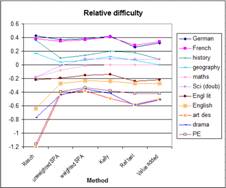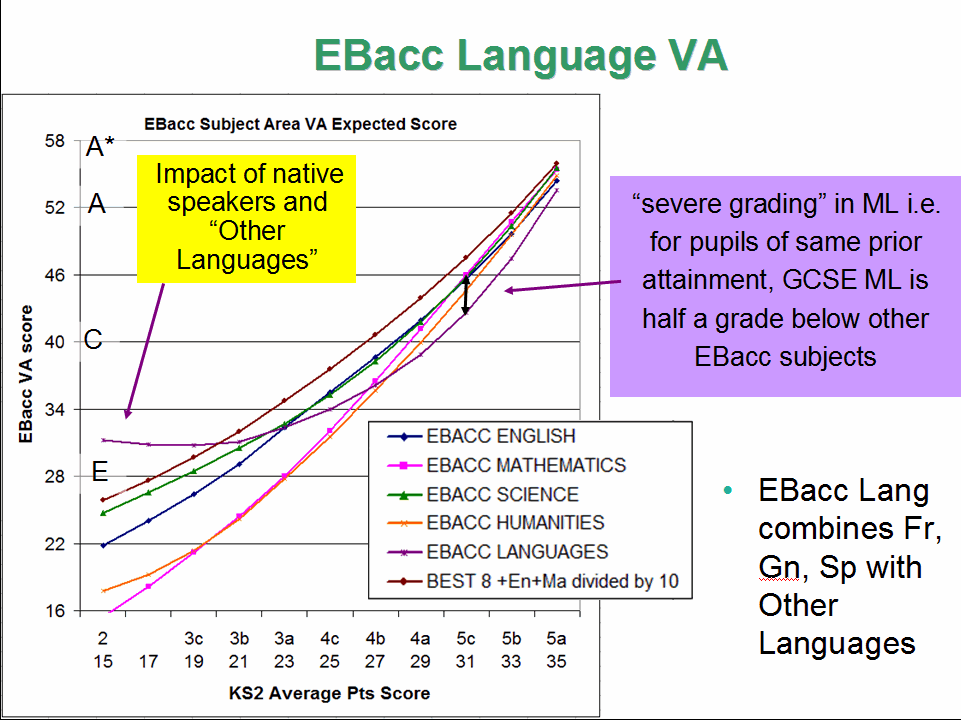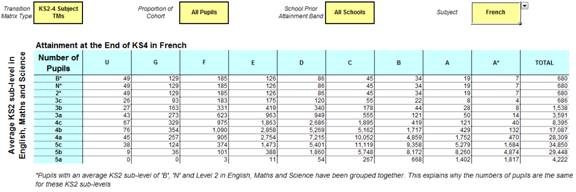ALL
London branch 
ALL
London branch |
Last update: 29/09/2013 |
StatisticsFigures are for
Download the following text here. Summary of situation regarding “severe grading” in GCSE ML
|
|
|
% A* grades 2010 |
% A* grades 2011 |
no. A* grades 2010 |
no. A* grades 2011 |
|
French |
10.8 |
10.1 |
17,635 |
14,289 |
|
German |
9.4 |
8.9 |
6,306 |
5,196 |
|
Spanish |
16.3 |
14.8 |
10,201 |
8,994 |
The outline proposal from ASCL, ALL and ISMLA is that grading in GCSE ML should be brought broadly into line with that in Mathematics (and thus also with other subjects such as Science, History and Geography).
· Recommendation in Dearing Review (Mar ’07) to investigate and establish facts at GCSE
·
 Dr
Robert Coe (
Dr
Robert Coe (
· Guardian article (12 Mar 2007) David Willetts, Conservative education spokesman, said: "If there is evidence modern languages is tougher than other GCSEs, then that is something that has to be corrected. They should be the same level of challenge as traditional academic GCSEs."
· Alan Johnson asks (Jun ’07) the QCA to conduct a review and is awaiting their advice on whether or not to change grade boundaries.
· QCA report 'Grade standards in GCSE modern foreign languages' published Feb ’08 accepts the reality of “severe grading” – see paragraphs 11-15
para. 12
To test its practical application we asked AQA, Edexcel and OCR to
calculate what changes there would be to their 2007 GCSE French results if the
grades were based only on the relationship between candidates’ key stage 3
test scores and their results in GCSE mathematics. The analyses indicated that
the changes would be marked at the higher grades. About half the candidates
presently awarded a grade B would gain a grade A as the threshold mark or
performance standard for a grade A would have to move down by about half a grade
width. There would be a similar effect at grade C.
· Ofqual hold their first Inter-subject comparability seminar (Oct ’08) with representatives from a range of organisations. Presentations from ML, STEM and English subject representatives. Issue of “severe grading” formally recognised, but different views about “next steps”.
Information is now available from the DfE Performance Tables website and the Ofsted/DfE RAISEonline website which shows the performance of all pupils in different subjects in terms of their prior attainment at KS2. The English Baccalaureate Languages measure combines many languages. The individual line on the right for French is around half a grade lower (similarly for German and Spanish)
 |
|
![]()
The main headlines, updates, news and comment on 2011 GCSE results:
- GCSE results: Gender gap widens in record-breaking year: www.bbc.co.uk
"Girls have increased their lead over boys in top-grade in GCSEs, in another record-breaking year of results. The performance gap between boys and girls has now reached its the widest ever - 6.7 percentage points - at the top grades of A* and A.
More exam entries overall were given the A and A* grades, and just under 70% were awarded between an A* and a C. The GCSE results show an increase, for the 23rd year running, in the proportion of entries awarded between an A* and a C grade.
Results day also reveals the popularity of different GCSE subjects, and this year saw an increase in the numbers taking individual sciences but a continued fall in numbers taking history, geography and modern foreign languages. ... the number of entries in both French and German dropped by 13.2%, while Spanish also saw a small decline and geography entries dropped by 7.1%."
- Alarm over decline in pupils studying languages: www.independent.co.uk
"A further dramatic slump in the number of pupils taking modern-languages GCSEs is alarming exam boards and teachers' leaders. Figures show that the take-up of French and German has fallen by 13.2 per cent in the past year to 154,221 and 60,887 respectively. It means fewer than one in four 16-year-olds now take French and one in 10 take German.
Even Spanish, which has been the only bright spot on the horizon with rising numbers in the past few years, has fallen by 2.5 per cent to 66,021. "Today's students are at risk of failing to to meet the needs of our universities, economy and society," said Wendy Piatt, director general of the Russell Group, which represents 20 of the country's top research universities."
- Interview with Nick Gibb: www.bbc.co.uk
- Nick Gibb comments on A-Level results: www.wired-gov.net
- GCSE results 2011: One in four entries gets A or A*: www.guardian.co.uk
- GCSE results - live blog: www.telegraph.co.uk
![]()
ALL was represented at the JCQ Briefing for Stakeholders where detailed information was issued.
The numbers entered for modern languages has shown a
further decline, with French declining from 177860 entries in 2010 to 154,221 in
2011 – a drop of 13% (German 70,174 to 60,887, 13%; Spanish 67,778 to 66,021,
3%)
The pattern is the same in
An unexpected factor in the figures released by JCQ is the drop in A* grades in French, German and Spanish in both percentages and actual numbers.
|
|
% A* grades 2010 |
% A* grades 2011 |
number A* grades 2010 |
number A* grades 2011 |
|
French |
10.8 |
10.1 |
17,635 |
14,289 |
|
German |
9.4 |
8.9 |
6,306 |
5,196 |
|
Spanish |
16.3 |
14.8 |
10,201 |
8,994 |
https://www.raiseonline.org/documentlibrary/ViewDocumentLibrary.aspx > Target-setting>Transition matrices for KS2 to 4
